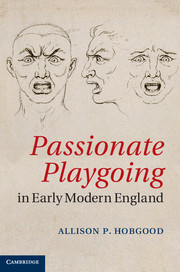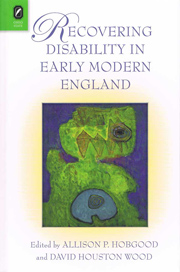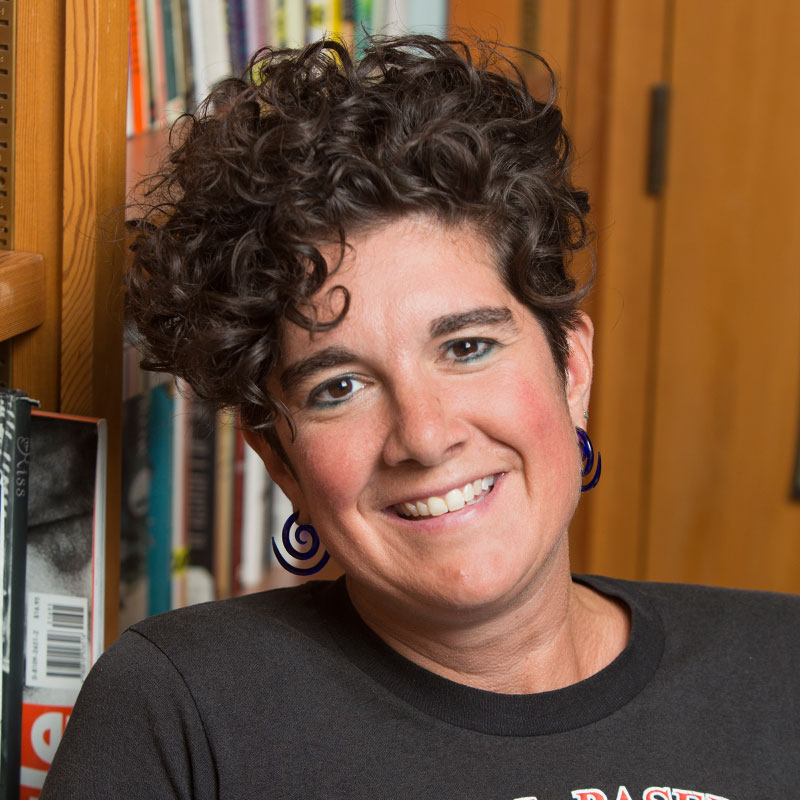Education
- PhD in English; certificate in Women's Studies, Emory University, 2007
- Masters of Arts in Teaching, Emory University, 2001
- Bachelor of Arts with Honors in English, Davidson College, 1999
Teaching Interests and Philosophies
Shakespeare, early modern literature, critical disability studies, feminist studies, queer studies, medieval literature.
My classroom practices are guided by the following notions:
- Learning is not about being safe; teaching is about taking risks.
- Learning is not about confirmation and comfort; teaching is about encouraging diversity of thought and understanding.
- Learning is not about confirming privileged ideas and social positions; teaching is about centering marginalized voices, epistemologies, and experiences.
- Learning is not about grades; teaching is about cultivating a love of knowledge for its own sake.
- Learning is not about monotonous content mastery; teaching is about pleasure, spontaneity, and harnessing the promise of what happens in the moment.
- Learning is not about random facts that have no place in the world; teaching is about relating critical thinking to our personal, everyday lives.
Research Interests
Currently, I am working on a new book called Beholding Disability in the English Renaissance. It builds on my work in early modern disability studies by exploring how old stories and ways of understanding embodied difference (ca. 1500-1700) influence how we know disability now. The book reanimates an archive of literary and other cultural texts to outline the lexicons of early modern disability, illuminate a cultural imagination of disability in Renaissance England, and provide readers with tools to grapple with mental and physical variation in a historical period whose ideals and norms often seem quite different from our own. Beholding Disability articulates early modern ideas about what constituted humanness, what was considered “normal,” and which variant bodies and minds were imagined as “less than.” It helps us comprehend how impaired bodies and minds constructed early modern cultural perceptions of normalcy. It likewise explores how art and literature produced radical counterdiscourses and aesthetic modes that challenged—and thus transformed—the period’s prevailing views of able-bodiedness.
 My first book, Passionate Playgoing in Early Modern England (March 2014, Cambridge UP), posited a new model of Renaissance subjectivity through investigation into the emotional force of spectatorship in early modern theater. Taking as a guiding principle the early modern cultural belief in “affective contagion,” the book rethinks theatergoing—what it felt like to be part of performances in English theater—as an intensely corporeal, highly emotive activity characterized by risky, even outright dangerous, bodily transformation. More radically, Passionate Playgoing contends that transformation happened not just to early modern spectators but to the plays themselves; drama not only depended for its effect on the emotions of audience members, but was reshaped and mutually constituted by early modern theatergoers. Reviewers describe the book as an “engrossing reclamation project that brings us as close as we can get to the experience of attending a play in an Elizabethan or Jacobean playhouse.”
My first book, Passionate Playgoing in Early Modern England (March 2014, Cambridge UP), posited a new model of Renaissance subjectivity through investigation into the emotional force of spectatorship in early modern theater. Taking as a guiding principle the early modern cultural belief in “affective contagion,” the book rethinks theatergoing—what it felt like to be part of performances in English theater—as an intensely corporeal, highly emotive activity characterized by risky, even outright dangerous, bodily transformation. More radically, Passionate Playgoing contends that transformation happened not just to early modern spectators but to the plays themselves; drama not only depended for its effect on the emotions of audience members, but was reshaped and mutually constituted by early modern theatergoers. Reviewers describe the book as an “engrossing reclamation project that brings us as close as we can get to the experience of attending a play in an Elizabethan or Jacobean playhouse.”
 Another of my recent projects is Recovering Disability in Early Modern England (Ohio State UP, 2013), a collected edition of essays co-edited with Professor David H. Wood. It’s a book that explores—for the very first time—disability through early modern representations of non-standard bodies and minds. The volume, praised by reviewers as valuable, timely, and innovative, merges critical disability studies and premodern literature to offer a new theoretical lens for considering Renaissance culture and, further, for enacting more politically invested classroom pedagogies. The collection asks: how do early modern investments in the "able" body construct the "disabled" body as its oppositional term? How were disabled persons represented in their respective cultures, both real and fictional? What traditions relating to disability did early modern writers inherit from the various theological, political, medical, and legal injunctions of the classical and medieval periods? Finally, what early modern views on disability inform our contemporary moment?
Another of my recent projects is Recovering Disability in Early Modern England (Ohio State UP, 2013), a collected edition of essays co-edited with Professor David H. Wood. It’s a book that explores—for the very first time—disability through early modern representations of non-standard bodies and minds. The volume, praised by reviewers as valuable, timely, and innovative, merges critical disability studies and premodern literature to offer a new theoretical lens for considering Renaissance culture and, further, for enacting more politically invested classroom pedagogies. The collection asks: how do early modern investments in the "able" body construct the "disabled" body as its oppositional term? How were disabled persons represented in their respective cultures, both real and fictional? What traditions relating to disability did early modern writers inherit from the various theological, political, medical, and legal injunctions of the classical and medieval periods? Finally, what early modern views on disability inform our contemporary moment?
In 2015, I edited a special issue of the journal Pedagogy (Duke UP, 2015) on the topic “Caring From, Caring Through: Pedagogical Responses to Disability.” This volume explores the ways in which living with or caring for (and along with) children, siblings, spouses, parents, and clients with disabilities informs our lives and teaching—beyond, of course, simply making one more sensitive to disability issues. The essays combine personal explorations and interrogations of care and in/dependence and the ideas and practices through which we create and enact our teacherly selves. Broadly, the issue addresses the ways academic professionals have seen their pedagogical methods change by experiences of caring from and through disability. Authors consider how intimate relationships with disabled individuals can transform conventional, ableist notions about the academy, learning, modes of intellect, and even the purposes of education. What—and how—has caring for/with/through disability, they contemplate, taught us about teaching?
Lastly, for more on disability studies and its important connections to sustainability, check out my Worldviews Wednesday radio interview on Salem's KMUZ.Selected Publications
“Prosthetic Encounter and Queer Intersubjectivity in The Merchant of Venice,” Textual Practice, 30.7 (Nov 2016), 1291-1308.
“Teeth Before Eyes: Illness and Invisibility in Shakespeare’s Richard III,” Disability, Health, and Happiness in Shakespeare, ed. Sujata Iyengar (Routledge, 2015).
“An Introduction: On Caring” and “An Afterword: Thinking Through Care” (with Jay Dolmage) in “Caring From, Caring Through: Pedagogical Responses to Disability;” special issue of Pedagogy: Critical Approaches to Teaching Literature, Language, Composition, and Culture, ed. Allison P. Hobgood, 15.3 (Oct 2015), 413-19, 559-67.
Passionate Playgoing in Early Modern England (Cambridge UP, March 2014)
Recovering Disability in Early Modern England (Ohio State UP, 2013)
"Caesar Hath the Falling Sickness: The Legibility of Early Modern Disability in Shakespearean Drama." Disability Studies Quarterly 29:4 (fall 2009): n. pag. Web. http://www.dsq-sds.org/article/view/993/1184
"The Bold Trespassing of a 'Proper Romantic Lady': Mary Tighe and a Female, Romantic Aesthetic." European Romantic Review 18:4 (fall 2007): 503-519. Print.
"Twelfth Night's 'Notorious Abuse' of Malvolio: Shame, Humorality, and Early Modern Spectatorship." Shakespeare Bulletin 24:3 (fall 2006): 1-22. Print.
Selected Courses
Paradise Lost, Humanities 497, senior thesis seminar on John Milton
Disability in Literature and Culture, College Colloquium, introductory course for incoming freshmen
Feminist Theory, Women's and Gender Studies 353, advanced course for majors
Literary Theory, second major course in English
Early Modern English Poetry, English 348, advanced course for majors and non-majors
Shakespeare, English 342, advanced course for majors and non-majors
Early Modern Drama, English 319, advanced course for majors and non-majors
Close Reading, English 201, first major course in English
Literary Theory, second major course in English
Figuring Faith in British Literature, English 117, writing-centered course primarily for non-majors
Literature and Disability Studies¸ English 116, writing-centered course primarily for non-majors
Daughters and Fathers in Life and Literature, College Colloquium, introductory course for incoming freshmen
Disability in Literature and Culture, College Colloquium, introductory course for incoming freshmen
Shakespeare in Popular Culture; English language and culture course for Japanese-speaking students at Tokyo International University
Global Disability Studies; transnational disability studies course for English-speaking graduate students at Tokyo International University

